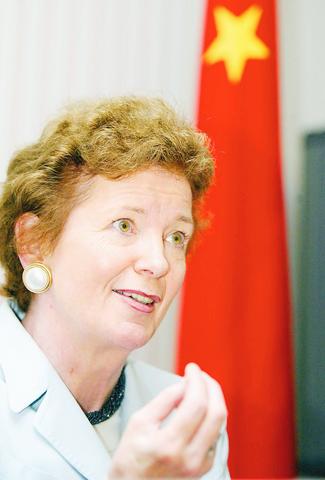On her last visit as UN human rights chief, Mary Robinson said yesterday China has made small steps on human rights, such as allowing family access to labor camp prisoners, but still has a long way to go.
After five years in office and seven visits to China, Robinson said "technical cooperation" between her office and Beijing had helped spawn minimal reforms to the widely criticized laogai or "re-education through labor" system.
It had also spurred human rights training for police and prison officers and discussions on introducing human rights education into primary and secondary schools, she said.

PHOTO: AP
But rights remained a concern as outlawed groups such as the Falun Gong spiritual movement were repressed, the death penalty was used widely, Tibet's culture was diluted and Tibetans had became a minority in the region's main city, Lhasa, she said.
The outspoken Robinson acknowledged some progress on laogai reform, a cornerstone of her China campaign, but said the government needed to abolish the system to fulfil a UN covenant on civil and political rights it has promised to ratify.
"We continue to bring it home to the Chinese authorities that, at the moment, re-education through labor for what they call punishment of minor crimes would not satisfy the criteria," she told reporters in reference to the covenant.
China says human rights have improved dramatically under Communist rule and accuses Western critics of imposing their values on a developing and largely impoverished country.
But Robinson said she told Chinese officials of her concerns that people were incarcerated in mental institutions for political reasons, as outlined in a report by the group Human Rights Watch earlier this month.
Robinson said she had also pressed vice foreign minister Wang Guangya to release prisoners, including Uighur businesswoman Rebiya Kadeer, jailed for eight years for mailing newspaper clippings to her husband who lives in America, and the historian Tohti Tunyaz.
She said the list included four men accused of leading mass labor protests in the northeastern city of Liaoyang in March.
Robinson said she had brought up many of the cases on previous visits but to no apparent avail. Wang gave assurances the cases were being examined, she said.
"I have made it clear both to the Chinese authorities and more publicly that I'm concerned that there isn't as much progress in relation to individual cases," she said.
However, China's rulers were grappling to find a new value system as discontent over greed and corruption spread and they showed signs of moving towards their critics on human rights, she said.

Palauan President Surangel Whipps Jr arrived in Taiwan last night to kick off his first visit to the country since beginning his second term earlier this year. After arriving at Taoyuan International Airport at around 6:30 pm, Whipps and his delegation were welcomed by Minister of Foreign Affairs Lin Chia-lung (林佳龍). Speaking to gathered media, the Palauan leader said he was excited and honored to be back in Taiwan on his first state visit to Taiwan since he was sworn in this January. Among those traveling with Whipps is Minister of State Gustav N. Aitaro, Public Infrastructure

President William Lai (賴清德) yesterday thanked Palau for its continued support of Taiwan's international participation, as Taipei was once again excluded from the World Health Assembly (WHA) currently taking place in Switzerland. "Palau has never stopped voicing support for Taiwan" in the UN General Assembly, the WHO and other UN-affiliated agencies, Lai said during a bilateral meeting with visiting Palau President Surangel Whipps Jr. "We have been profoundly touched by these endorsements," Lai said, praising the Pacific island nation's firm support as "courageous." Lai's remarks came as Taiwan was excluded for the ninth consecutive year from the WHA, which is being held in

RESOLUTIONS DEBATE: Taiwan’s allies said that UN and WHA resolutions cited by China and other nations ‘do not determine Taiwan’s participation in WHO activities’ A proposal to invite Taiwan to this year’s World Health Assembly (WHA) was rejected on Monday, resulting in Taipei’s absence from the annual meeting for a ninth consecutive year, although partners spoke up for Taiwan’s participation at the first day of the meeting. The first agenda item after the opening was a “two-on-two debate” on a proposal to invite Taiwan to participate at the WHA as an observer. Similar to previous years, two countries made statements in favor of the proposal, while two others expressed their opposition. Philippine Secretary of Health Teodoro Herbosa, president of the 78th WHA, accepted the WHA General Committee’s

At least three people died and more than a dozen were injured yesterday afternoon when a vehicle struck a group of pedestrians in New Taipei City’s Sansia District (三峽). The incident happened at about 4pm when a car rammed into pedestrians at an intersection near Bei Da Elementary School. Witnesses said the sedan, being driven at a high speed, ran a red light, knocking scooters out of the way and hitting students crossing the road before careening into a median near the intersection of Guocheng and Guoguang streets. The incident resulted in three deaths and 13 injuries, including the driver, a 78-year-old man